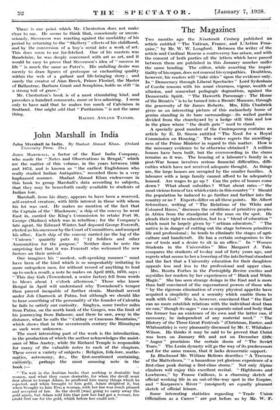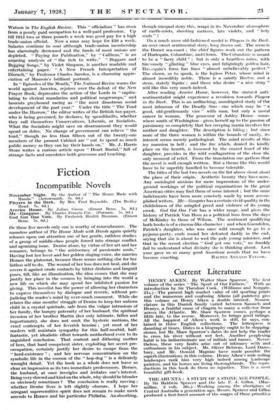The Magazines •
Two months ago the Nineteenth Century published an article entitled " The Vatican, France, and L'Action Fran- caise," by Mr. W. W. Longford. Between the writer of the article and Cardinal Bourne a controversy has arisen, and with the consent of both parties all the letters which have passed between them are published in this January number unWr the same heading. The editor, while asserting the impar- tiality of his organ, does not conceal his sympathies. Doubtless, however, his readers will "take sides" upon the evidence only In " Democracy through Liberal Spectacles " Lord Sydenhafri of Combe reasons with his usual clearness, vigour, wealth of allusion, and somewhat pedagogic dogmatism, against the Democratic Spirit. " The Haworth Parsonage : The" Home of the Brontes " is to be turned into a Bronte Museun, throng% the generosity of Sir James Roberts. Mrs. Ellis Chadwick gives us an interesting picture of this melancholy home of genius standing in its bare surroundings—its walled garden divided from the churchyard by 'a hedge still thin and low in the place where " the death gate" used to stand. • A specially good number of the Contemporary contains an article by E. D. Simon entitled " The Need for a Royal Commission on Housing." The writer regrets the unwilling- ness of the Prime Minister in regard to this matter. How is the necessary evidence to be otherwise obtained ? A million houses have been built, bid the overcrowding in the slums remains as it was. The housing of a labourer's family in a post-War house involves serious financial difficulties, diffi- culties which have not received adequate thought. As things are, the large houses are occupied by the smaller families. A labourer with a large family cannot afford to be adequately housed. Are wages to go up ? Can the price of houses come down ? What about subsidies ? What abciut rates—" the most vicious form of tax which exists in this country" ? Should the population be induced to go further and further into the country or no ? Experts differ on all these points. Mr. Albert Schweitzer, writing of " The Relations of the White and Coloured Races," discusses the conditions of primitive peoples in Africa from the 'standpoint of the man on the spot. He pleads their right to education, but to a " blend of education which must be largely given by " artizan educators." " The native is in danger of cutting out the stage between primitive life and professional ; he tends to eliminate the stages of agri. culture and handicraft. He has a certain antagonism to the use of tools and a desire to sit in an office." In Women Students in the Universities " Miss Margaret J. Tuke compares the students of to-day and of forty years ago, and regrets what seems to her a lowering of the intellectual standard and the fact that a University education for their daughters appeals less and less to the professional and upper class.
Mrs. Rosita Forbes in the Fortnightly Review excites and mystifies her readers by her experiences of " Black and White Magic." She has seen strange doings in the East and is more than half convinced of the supernatural powers of those who " by the rigorous elimination of every physical appetite have acquired a simplicity and a serenity which enable them to walk with God." She is, however, convinced that " the East can no more establish relations with the individual dead than we can," though its sages " can so separate mind and body that the former 'has an existence of its own and the latter can, if
necessary, be 'independent of any material need." The History of the Three Great Festivals " (Christmas, Easter, and. Whitsuntide) is very pleasantly discussed by Mr. C: Whitaker.:- Wilson. He thinks it may be said to be proved that Christ was born on January 6th and not on December 25tht- " Augur " proclaims the certain doom of " The Soviet' Tsars." The Lenin dynasty will go the way of its predecessors and for the same reason, that it lacks democratic support:- In Blackwood Mr. William Bellows describes "A Traverse of the Matterhorn," " a hazardous yet glorious experience of a first-class peak during a first-class storm." Not only Alpine' climbers will enjoy this excellent recital. " Highbrows and Lowbrows," by Pousse Cailloux, is a charming sketch of official working life in an out-of-the-way spot in the. Empire, and " Karpreen's River " • (unsigned) an equally pleasant sketch of official leisure.
Some interesting statistics regarding " Trade Union- Officialism as a Career" are put before us by Mr. W.. P. Watson in The English Review. This " officialism r has risen from a poorly paid occupation to a well-paid profession. Up till 1915. two or three pounds a week was good pay for a high' trade-union official. Now a man may hope for £20 a week. Salaries continue to soar although trade-union membership has alarmingly decreased and the funds of most unions are.
depleted. Paying for Publication," by " Callinus," is an amusing analysis of " the itch to write." " Beggars and fivgging Songs," by Violet Simpson, is another readable and entertaining paper. " A New French Interpretation of Disraeli," by Professor Charles Sarolea, is a channing apPre: ciation of Maurois's brilliant portrait.
In " Episodes of the Month," The National Review warns the world against America, rejoices over the defeat of the New Prayer Book, deprecates the action of the Lords in " capitu- lating to clerical mandarins and political mugwumps," and laments greyhound racing as ." the most disastrous social development of the past year." Under the title " The Toad under the Harrow," the editor writes of the British tax-payer, who is being governed', he declares, by spendthrifts, whether they call themseives Conservatives, Liberals, or Socialists. What the Socialists might save on disarmament they would spend on doles. No change of government can relieve " the toad," though no less than fifteen out of the twenty-one members of the present Cabinet are " out to spend as much public money as they can lay their hands on." Mr. J. Farris Stone writes a curious article upon " Heart Burial," full of strange facts and anecdotes both gruesome and touching.







































 Previous page
Previous page